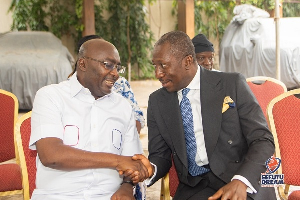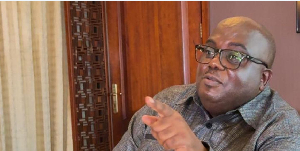By: Richard Ellimah
Over the weekend a tragic incident occurred at the Obuasi Mine of AngloGold Ashanti in the Ashanti Region. The company's Corporate Affairs Manager, the affable Mr. John Owusu was reportedly run over by a company vehicle as he together with a group of company officials and journalists were fleeing from rampaging illegal miners who were pelting them with stones. The death of Mr. Owusu has sent shock waves within the mining industry and resurrected the often contentious debate about illegal mining. More significant is the broader discussion of the relationship between small scale miners and large scale operators. That Mr. Owusu, a known advocate of engagement with small scale miners lost his life in the line of duty, and in such a gory manner, makes the discussion even more apt.
To get a clearer picture of events it is necessary to put things in perspective. In 1897 Sir Edwin Arthur Cade, a British merchant, acquired a 485 square kilometers of gold mining concession from the Adansi and Amansie traditional authorities. The concession,previously owned and operated by two Fante merchants: Chief Joseph E. Ellis and Chief Joseph E. Biney for seven years, was sold due to British colonial law that criminalized ownership of mines by indigenes. With the acquisition of this concession by Edwin Arthur Cade, no one could effectively mine within the Obuasi area except this British company. Currently the concession spans five administrative districts: Obuasi Municipal, Bekwai Municipal, Amansie Central District, Adansi North District, and Adansi South district. Effectively what this means is that nobody, even with the needed capital, machinery and human resource could do legal small scale mining in any of the five districts. This economic injustice is at the heart of the small scale mining conundrum in Obuasi.
Managing such a huge concession (the biggest mining concession in Ghana) came with its own challenges for AGA. For instance the company appeared to be perpetually fighting off invasion by community people who live right within the concession as well as artisanal and small scale miners who had illegally cut out a portion of the concession for themselves. Thecompany’s response to this invasionin the past has been to use the military/Police but this also led to serious human rights violations which cost the company dearly.
The company then changed strategy in response to public criticism by agreeing to release 273 square kilometres of its concession (almost 60 percent) to the government about three years ago.For residents of Obuasi, the expectation was that this ceded concession would then be made available to registered small scale miners who had an interest in doing legal small scale mining.
It has been almost three years since AGA presented its proposal of surrender to the Minerals Commission. However the Commission, Environmental Protection Agency (EPA) and Office of Administrator of Stool Lands (OASL) are yet to finalise the process of securing a Surrender Certificate to seal AGA’s proposal. While waiting for a response from government, tension between the small scale miners and AngloGold Ashanti continues to escalate. The situation got so bad that at a point the military had to be permanently stationed in the mine to ward off these miners, who were waiting on the sidelines to launch an invasion of the mine. Only last week the military was ordered out of the mine by the Minister of Lands and Natural Resources, after visiting the mine and satisfying himself that there was no cause for alarm. That decision has proven costly as later events have shown!
The Obuasi Artisanal and Small Scale Mining Association has actively campaigned to get a concession to work on. At least, late last year they organised two big demonstrations that attracted thousands of members. Unfortunately the target of these demonstrations has been misplaced. In their petition to the President via the Municipal Chief Executive for Obuasi, they have impressed on AngloGold Ashanti to release part of their concession for them to work. This they did, ostensibly unaware that under the law AngloGold Ashanti could not cede off any part of its concession to a third party. Rather than pile pressure on the Minerals Commission to give them a concession, they chose to unjustifiably attack AngloGold Ashanti. This is the stage where the Minerals Commission should have stepped in to educate the local miners on the procedures for acquiring mineral concession.
The role of the ever cancerous Ghanaian politics also comes to play in this mess. During the 2008 electioneering campaigns, the then Presidential Candidate of the National Democratic Congress (NDC), the late Professor John Evans Atta Mills promised to "regularise" small scale mining if he got elected as President. Truly from 2009 till 2012 galamsey in Obuasi experienced a major boom, positively affecting the local economy. The unprecedented high price of gold on the international market also fueled this boom. The local miners managed to negotiate a deal with AngloGold Ashanti to mine their abandoned pits. At this stage management ofAGA looked the other way as these miners had a field day. This sweet honeymoon however ended when the miners, in a daring move started invading the underground mine of AGA. This move, deemed unacceptable by the company was fiercely resisted. Through the Ghana Chamber of Mines and mainstream media, AngloGold Ashanti launched a fierce battle to "flush out" these illegal miners.
Feeling betrayed, the illegal miners directed their anger at the ruling party. At least the former Municipal Chief Executive (MCE) for Obuasi, and now Ashanti Regional Minister designate, Hon. John Alexander Ackon came under a barrage of criticisms for apparently betraying the cause of the local miners. Similarly the current MCE has been reported as also promising the local miners a concession should he get elected as Member of Parliament for Obuasi East. While I will be the first to applaud any move to get local small scale miners a concession, I believe it is dangerous when politicians across the political divide interfere in processes which they have very little or no control over.
So how can this problem be addressed? First of all it is important to acknowledge the monumental failure of successive governments since independence to support the creation of a vibrant alternative industry to multinational mining in Obuasi. This unhealthy dependence on AGA has become so bad that the maxim "AGA is Obuasi and Obuasi is AGA" has gained deep roots in the psychology of the city. Tying the fortunes of the city to one big multinational mining company was not such a wise thing to do. Due to the absence of any viable alternative to mining, the youth in the communities who have already lost their farmlands to mining and cannot also get employed in the mine because of low education and lack of skills, feel compelled to go into illegal mining. The most sustainable intervention government can take to address the negative consequences of illegal mining is to roll out a comprehensive youth empowerment programme. An apprenticeship programme that addresses the needs of youth in the communities should be vigorously promoted to dissuade many of the youth from illegal mining.
Furthermore, it should also be possible for interested entrepreneurs with the requisite capital to also legally acquire concessions to mine. This process begins with the conclusion of the surrender process by AngloGold Ashanti. The Minerals Commission should then be able to give out the concession to interested people who want to own mines. Ultimately with time, Obuasi should also get additional mines to AGA. These would be mines that are properly regulated and controlled so that the local economy and the nation derive maximum benefit from their existence.
Engaging the leadership of the Obuasi Small Scale Miners Association will be a positive step aimed at reducing the simmering tension with the company. Conflict is too costly. It makes no economic sense for the company to be spending thousands of dollars each year to maintain peace. Added to this is the irreversible damage such conflicts do to the image of the company. A healthy engagement between the two is the way to go. While at it, local politicians should keep their hands off this issue!
John Owusu believed strongly in engagement with all stakeholders of the mine, including communities and small scale miners. He successfully participated in several engagements on behalf of the company. His death should not signal the end of this engagement. Obuasi must rise again!
The author is the Executive Director of Centre for Social Impact Studies (CeSIS). He can be reached on richellimah@gmail.com, or 024 451 4559.
Opinions of Monday, 15 February 2016
Columnist: Ellimah, Richard
Illegal mining, the politics and a needless death
Opinions













